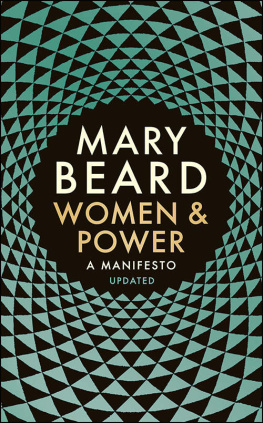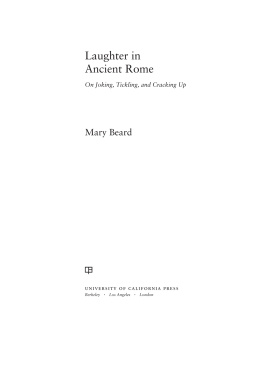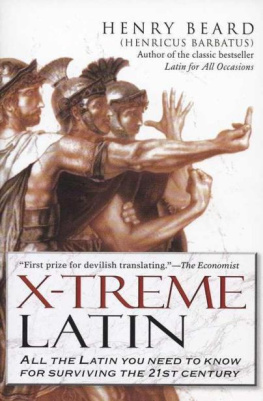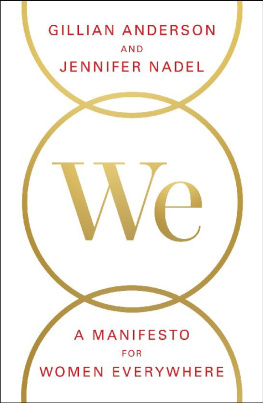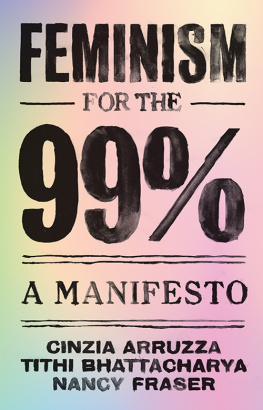Beard - Women & Power: A Manifesto
Here you can read online Beard - Women & Power: A Manifesto full text of the book (entire story) in english for free. Download pdf and epub, get meaning, cover and reviews about this ebook. year: 2017;2018, publisher: Profile;Tiptree Book Service, genre: Romance novel. Description of the work, (preface) as well as reviews are available. Best literature library LitArk.com created for fans of good reading and offers a wide selection of genres:
Romance novel
Science fiction
Adventure
Detective
Science
History
Home and family
Prose
Art
Politics
Computer
Non-fiction
Religion
Business
Children
Humor
Choose a favorite category and find really read worthwhile books. Enjoy immersion in the world of imagination, feel the emotions of the characters or learn something new for yourself, make an fascinating discovery.
- Book:Women & Power: A Manifesto
- Author:
- Publisher:Profile;Tiptree Book Service
- Genre:
- Year:2017;2018
- Rating:4 / 5
- Favourites:Add to favourites
- Your mark:
- 80
- 1
- 2
- 3
- 4
- 5
Women & Power: A Manifesto: summary, description and annotation
We offer to read an annotation, description, summary or preface (depends on what the author of the book "Women & Power: A Manifesto" wrote himself). If you haven't found the necessary information about the book — write in the comments, we will try to find it.
Women & Power: A Manifesto — read online for free the complete book (whole text) full work
Below is the text of the book, divided by pages. System saving the place of the last page read, allows you to conveniently read the book "Women & Power: A Manifesto" online for free, without having to search again every time where you left off. Put a bookmark, and you can go to the page where you finished reading at any time.
Font size:
Interval:
Bookmark:

With clearsightedness and wry humour, this self-described gobby woman proves public speech is no longer the preserve of maleness. More power to her. Laura Garmeson, Financial Times
A modern feminist classic Rachel Cooke, Observer
This book is a treasure, both as a fascinating read in itself and as a fine work of reference to correct our lazy misconceptions about an ancient world that still has much to instruct us today. Herald
An urgent feminist cri de coeur, spot-on in its utterly reasonable plea that a woman who dares to open her mouth in public actually be given a hearing. Kirkus Reviews
Brilliant Jacqueline Rose, Guardian
Enlightening explains how misogyny works and why it is so resilient. Elif Shafak
A sparkling and forceful manifesto New York Times
Clear, rich, subversive and witty San Francisco Chronicle
Mary Beard has become something of a star when it comes to bringing classical history to life. She exposes the roots of todays expectations of how a woman should behave A small but wonderfully potent call to action. Jenni Murray, Guardian
An irresistible call for women to speak up, act and redefine their power. People Magazine
Witty and uncompromising, this is a searing analysis of womens access to, and relationship with, power throughout the ages. Kaite Welsh, DIVA Magazine
A timely examination of the damaging ways in which we are all complicit with womens silence, and should be required reading for anyone who believes gender equality to be an issue of the past. Samantha Fu, LSE Review of Books
Every man should read this. Dan Brotzel, Western Morning News
WOMEN & POWER
ALSO BY MARY BEARD
SPQR: A History of Ancient Rome
Laughter in Ancient Rome
The Roman Triumph
Confronting the Classics
Pompeii: The Life of a Roman Town
Its a Dons Life
All in a Dons Day
The Parthenon
The Colosseum (with Keith Hopkins)

This paperback edition published in 2018
First published in Great Britain in 2017 by
PROFILE BOOKS LTD
3 Holford Yard
Bevin Way
London WC1X 9HD
www.profilebooks.com
and
LONDON REVIEW OF BOOKS
28 Little Russell Street
London WC1A 2HN
www.lrb.co.uk
A version of The Public Voice of Women, first appeared in the London Review of Books, 20 March 2014; Women in Power was published, also in the London Review of Books, 16 March 2017. Both were lectures presented by Mary Beard in the LRB Winter Lecture series.
Copyright Mary Beard Publications Ltd, 2017, 2018
The moral right of the author has been asserted.
All rights reserved. Without limiting the rights under copyright reserved above, no part of this publication may be reproduced, stored or introduced into a retrieval system, or transmitted, in any form or by any means (electronic, mechanical, photocopying, recording or otherwise), without the prior written permission of both the copyright owner and the publisher of this book.
A CIP catalogue record for this book is available from the British Library.
ISBN 9781788160612
eISBN 9781782834533
For Helen Morales
WOMEN IN THE WEST have a lot to celebrate; lets not forget. My mother was born before women had the vote in parliamentary elections in Britain. She lived to see a female Prime Minister. Whatever her views of Margaret Thatcher, she was pleased that a woman had reached Number 10 and proud to have had a stake herself in some of those revolutionary changes of the twentieth century. Unlike generations before her, she was able to have a career and marriage and a child (for her own mother pregnancy necessarily meant the end of her job as a teacher). She was a strikingly effective head of a large primary school in the West Midlands. I am sure that she was the very embodiment of power to the generations of girls and boys in her charge.
But my mother also knew that it was not all quite so simple, that real equality between women and men was still a thing of the future, and that there were causes for anger as well as for celebration. She always regretted not going to university (and was selflessly pleased that I was able to do just that). She was often frustrated that her views and her voice were not taken as seriously as she hoped they would be. And, though she would have been puzzled at the metaphor of the glass ceiling, she was well aware that the further up the career hierarchy she went, the fewer female faces she saw.
She was often in my mind when I was preparing the two lectures on which this book is based, delivered, courtesy of the London Review of Books, in 2014 and 2017. I wanted to work out how I would explain to her as much as to myself, as well as to the millions of other women who still share some of the same frustrations just how deeply embedded in Western culture are the mechanisms that silence women, that refuse to take them seriously, and that sever them (sometimes quite literally, as we shall see) from the centres of power. This is one place where the world of the ancient Greeks and Romans can help to throw light on our own. When it comes to silencing women, Western culture has had thousands of years of practice.
I WANT TO START very near the beginning of the tradition of Western literature, and its first recorded example of a man telling a woman to shut up; telling her that her voice was not to be heard in public. I am thinking of a moment immortalised at the start of Homers Odyssey, almost 3000 years ago. We tend now to think of the Odyssey as the epic story of Odysseus and the adventures and scrapes he had returning home after the Trojan War while for decades his wife Penelope loyally waited for him, fending off the suitors who were pressing to marry her. But the Odyssey is just as much the story of Telemachus, the son of Odysseus and Penelope. It is the story of his growing up and how over the course of the poem he matures from boy to man. That process starts in the first book of the poem when Penelope comes down from her private quarters into the great hall of the palace, to find a bard performing to throngs of her suitors; he is singing about the difficulties the Greek heroes are having in reaching home. She isnt amused, and in front of everyone she asks him to choose another, happier number. At which point young Telemachus intervenes: Mother, he says, go back up into your quarters, and take up your own work, the loom and the distaff speech will be the business of men, all men, and of me most of all; for mine is the power in this household. And off she goes, back upstairs.
There is something faintly ridiculous about this wet-behind-the-ears lad shutting up the savvy, middle-aged Penelope. But it is a nice demonstration that right where written evidence for Western culture starts, womens voices are not being heard in the public sphere. More than that, as Homer has it, an integral part of growing up, as a man, is learning to take control of public utterance and to silence the female of the species. The actual words Telemachus uses are significant too. When he says speech is mens business, the word is
Font size:
Interval:
Bookmark:
Similar books «Women & Power: A Manifesto»
Look at similar books to Women & Power: A Manifesto. We have selected literature similar in name and meaning in the hope of providing readers with more options to find new, interesting, not yet read works.
Discussion, reviews of the book Women & Power: A Manifesto and just readers' own opinions. Leave your comments, write what you think about the work, its meaning or the main characters. Specify what exactly you liked and what you didn't like, and why you think so.

